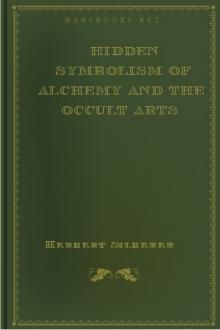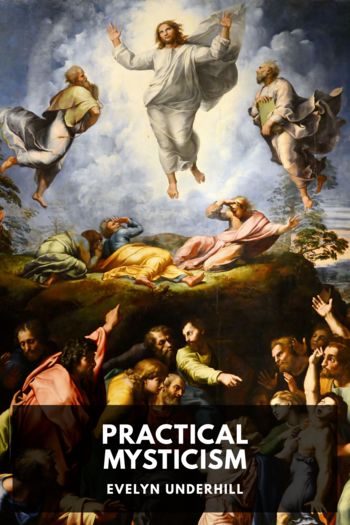Hidden Symbolism of Alchemy and the Occult Arts by Herbert Silberer (e book reader free .txt) 📕

- Author: Herbert Silberer
- Performer: -
Book online «Hidden Symbolism of Alchemy and the Occult Arts by Herbert Silberer (e book reader free .txt) 📕». Author Herbert Silberer
The conception advocated by me gives their due to the nature mythologists just as much as to the psychologists that oppose them. It reinstates, moreover, a third apparently out-worn tendency [the so-called degeneration theory] that sees in the myth the veiling of ancient priestly wisdom. This obsolete view had the distinction that it placed some value, which the modern interpreters did not, on the anagogic content of the myths (even if in a wrong perspective). The necessity of reckoning with an anagogic content of myths results from the fact that religions with their ethical valuations, have developed from mythical beginnings. And account must be taken of these relations. In the way in which the older interpretations of myths regarded the connection, they pursued a phantom, but their point of view becomes serviceable as soon as it reverses the order of evolution. It is not true that the religious content in myths was the priestly wisdom of antiquity, but rather that it became such at the end of the development. My conception shows further that the utmost significance for the recognition and comparison of the motives (corresponding to the psychological types) attaches to the material so brilliantly reconstructed by Stucken and other modern investigators, but not the convincing evidence which some think they find there for the migration [pg 335] theory, as against the theory of elementary thoughts.
With regard to the possibly repellent impression derived from the notion of an unconscious thought activity of the myth forming phantasy, I should like to close with these words of Karl Otfried Müller: “It is possible that the concept of unconsciousness in the formation of myths will appear obscure to many, even mysterious ... but is history not to acknowledge the strange also, when unprejudiced investigation leads to it?”
In the preceding section the symbolism and the psychology of the progress of the mystic work has been developed more or less, but certainly not to the end. Regeneration is evidently the beginning of a new development, the nature of which we have not yet closely examined. Nothing has yet been said definitely about the later phases of the work and about its goal. I am afraid that this section, although it is devoted chiefly to the goal of the work, cannot elucidate it with anything like the clearness that would be desirable. To be sure the final outcome of the work can be summed up in the three words: Union with God. Yet we cannot possibly rest satisfied with a statement that is for our psychological needs so vague; we must endeavor to comprehend the intimate nature of the spiritual experiences that we have on the journey into the unsearchable; although I must at the outset point out that at every step by which the symbolism of the mystics leads us towards regeneration, we run the risk of wandering away from psychology, and that in the following we shall all too soon experience these deviations. We shall have to transplant ourselves uncritically [pg 337] at times, into the perceptual world of the hermetics, which is, of course, a mere fiction, for in order to do it rightly we should have to have a mystical development behind us [whatever this may be]; one would have to be himself a “twice born.” One thing can be accepted as true, that a series of symbols that occur with striking agreement among all mystics of all times and nations is related to a variety of experiences which evidently are common to all mystics in different degrees of their development, but are foreign to the non-mystics (or more exactly to all men, even mystics, who have not attained the given level).
With this premise I will take up the question of the goal of alchemy (mysticism). In this I follow in general the train of thought of Hitchcock, without adhering closely to his exposition. (I cite H. A. = Hitchcock, Remarks upon Alchemy.)
The alchemistic process is, as the hermetics themselves say, a cyclical work, and the end resides to a certain degree in the beginning. Here lies one of the greatest mysteries of the whole of alchemy, although the meaning of the language is to be understood more or less as follows. If, for example, it is said that whoever wishes to make gold must have gold, we must suppose that the seeker of truth must be true (H. A., p. 67); that whoever desires to live in harmony with the conscience must be in harmony with it, and that whoever will go the way to God, must already have God in himself. Now when the conscience, wherein the sense of right and justice has [pg 338] existence, becomes active under the idea of God, it is endowed with supernatural force and is then, as I understand it, the alchemists' philosophical mercury and his valued salt of mercury. It is no less his sovereign treacle, etc. (H. A., p. 53). The progress of the work points to some kind of unity as the goal which, however, very few men attain except in words (H. A., p. 157). The hermetic writers set up the claim to a complete agreement in their teachings, but this agreement is restricted to some principles of vital significance in their doctrine, which have reference almost exclusively to a definite practice; probably to a complete setting to work of the consciousness of duty, which is what Kant claims to do with his categorical imperative: “An unreasoning, though not unreasonable, obedience to an experienced, imperious sense of duty, leaving the result to God; and this I am disposed to call the Way.”
And the like in many places in the Bhagavad-Gita.
Now the end is perhaps the fruit of this obedience. It may be that the steady preservation of the inward unity, which regards with composure all external vicissitudes, leads man finally to some special experience, by which a seal of confirmation is set [pg 339] upon what was first a mere trust in the ultimate blessing of rectitude (H. A., p. 128). The hermetic philosophers would have the conscience known as the Way or as the base of the work, but with regard to the peculiar wonder work of alchemy (transmutation) they place the chief value on love; it effects the transformation of the subject into the object loved (H. A., p. 132).
Arabi: “It is a fundamental principle of love that thou becomest the real essence of the beloved (God) in that thou givest up thy individuality and disappearest in him. Blessedness is the abiding place of the divine and holy joy.” (Horten, Myst., I, p. 9.)
Similarly we find in the yoga primers that the spirit, by sinking into an object of perception, becomes identical with the object. The object need not be the very highest, but a gradation is possible. Arabi, too, recognizes a gradation of objects, as they correspond, as correlates of sinking or surrender, to the different mystical states. [Colors, etc., of alchemy.] Two passages of Arabi may be quoted: “My heart is eligible for every form [of the religious cult]; for it is said that the heart (root: kalaba = overturn, to alter oneself) is so called from its continual changing.” It changes in accordance with the various (divine) influences that it feels, according to the various states of the mystical illumination. This variation of experiences is a result of the variation of the divine appearances, which occur in its inmost spirit. The law of religion (theology) [pg 340] speaks of this phenomenon as the changing and metamorphizing in the forms (of living and being). Gazelles are the objects of the mystic's love. In one of his poems he says: “And surrender yourselves to play in the manner of lovely maidens with buxom breasts and enjoy the luxuriant willows in the manner of the female gazelles.” In his commentary on this passage he says: “ ‘Play’ denotes the various states of the mystic, to which he is advanced when he passes from one divine name to another.” (Horten, Myst., I, pp. 11, 13, ff.)
It is the ethical ideal of the mystic, more and more to put off the limited ego, and to take on in its place the qualities of God, in order to become God.
When with Arabi the theme of an ode is “Through asceticism, fervent yearning after God and patience in suffering, man becomes God or acquires divine nature” (Horten, Myst., I, p. 16), then this goal is identical with that of the alchemistic transmutation; the base metal acquires (after purification, refining, etc.) by virtue of the tincturing with the Philosopher's Stone the nature of gold, i.e., the divine nature.
But patient effort is requisite. Precipitancy is as great an evil as inactivity. It is, to use the language of the alchemists, just as bad to scorch the tender blossoms by a forced and hasty fire (that in spite of its intensity may be merely a straw fire), as to let go out the fire which should be continuously kept alight, and to let grow cold the materia. The process of distillation is to be accomplished slowly, [pg 341] so that the spirits may not escape. That which rises as steam through the “heating” in the “receptacle” (i.e., in man) is the soul rising into the higher regions. Distilling like rain drops [destillare = drop down], it brings each time to the thirsting materia a divine gain. But this process is not to be overdone, for the thirsting earth must be gently instilled with the heavenly moisture of the water of life: the process of “imbibition.”
The metallic subject must be gently dissolved in its own natural water (conscience), not with powerful media, not with corroding acids, which the foolish employ in order to reach the goal in a hurry, for by such means he either spoils the materia or produces a merely superficial action. Senseless asceticism and the like are just as objectionable as the impetuous enthusiasm (which we called straw fire here). The ethical work of alchemy as of common life is a sublimation; it is important that the materia takes up at any time only as much as it can sublimate. We may also conceive it in this way. The materia is to be moistened only with the water that it can utilize after the solution has taken place (i.e., keep in enduring form, absorb into their nature). Compare in this connection the words of Count Bernhard von Trevis: “I tell you assuredly that no water dissolves any metallic spices by a natural solution, save that which abides with them in matter and form, and which the metals themselves, being dissolved, can recongeal.” (H. A., pp. 189 ff.)
[pg 342]The passage “slowly and quite judiciously” of the Smaragdine tablet will now be fully appreciated.
The desired completion or oneness should be a state of the soul, a condition of being, not of knowing. The means that lead to it presuppose in the neophyte something analogous to religious faith, and because the conditions of the mastery appear to the neophyte to contradict nature or each other, the mystical experiences that are derived from it are called “supernatural.” The “supernatural” is, however, only an appearance, which results when we conceive nature too narrowly, as when we see in her merely the totality of bodies. If we mean by nature the possibility of life and activity, then that which appears supernatural must be counted as nature. The expressions natural and supernatural are but means of the thinking judgment, they





Comments (0)